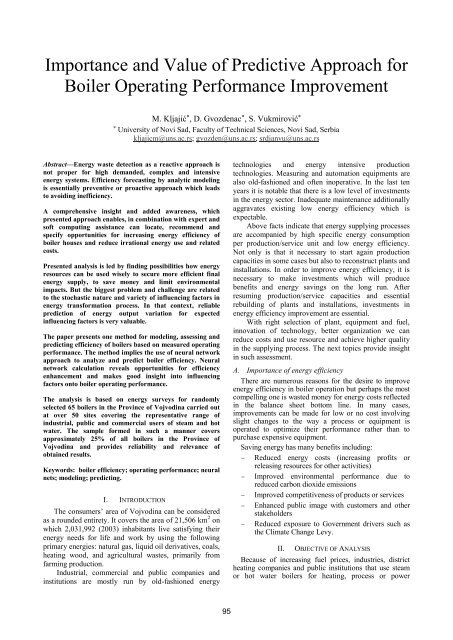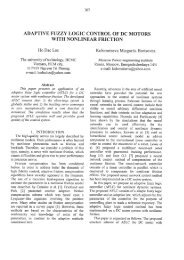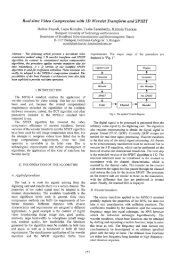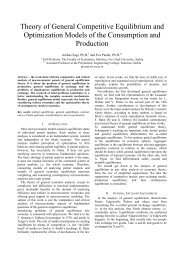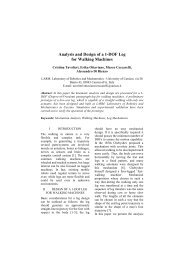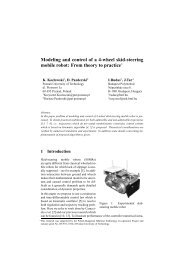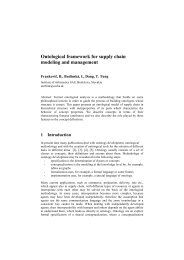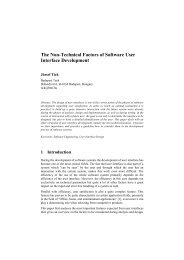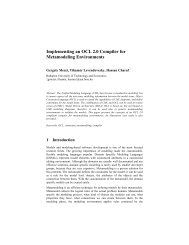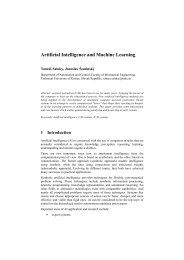2 kevap Aevap0 ,2 Q evap mp cp Tpe T (17) kevap Aevap mp cp 1 1P realm hW . (18)imD. The optimal function of the partial systemsupplemented by evaporation stageA new cost emerges.O T , Q O ( 321T ) , (19) 4321 o evapoWhereby Q is the known value added to T 0 .evapHeat quantity provided by evaporatorQ Qevap consumer Preal COPPreal. (20) Preal PrealCOP1The stage’s optimum is expressed by functionO 4321( T 0, Q evap) in the function of evaporationtemperature and the heat output of the evaporator.E. Optimal function for the partial systemsupplemented by U-tube stageThe new cost is the electronic power use of thecirculated fluid in the U-tube’s hydraulic system.O54321m, Tpo mpk e Rp pminmp , Tpv 1 1 O em34321 To , (21)Whereby R p is hydraulic resistance coefficient of the U-tube’s hydraulic system, k e is the unit cost of electricpower, eis the pump efficiency and mis the motorefficiency. The function equation (21) is solvednumerically. We set mpand make T 0 a known, fixedparameter value. Fixed to T 0 Qevap QU tubeis known aswell. By this we are able to calculate the value of T pv ,which isTpv TQkevapU tube AevapQ2mU tube0. (22)pcBased on differential equations (23), (24) the obtainedvalues [8], [9], [10], [11] are utilized to determine theextractable heat capacity belonging to value T pv andcalculated by equation (22) to the mass flow of certainprimary fluids. Then, we compare this heat capacity withthe heat capacity calculated during optimization, with thevalues of Qevap QU tubeheat capacity utilized inequation (22). Provided that the heat capacity value of theU-tube calculated by equations (23), (24) equals to or issmaller than heat capacity values utilized in equation (22)belonging to mass flow m , which was applied asparameter, then the givenpppm is applicable. If however,the calculated heat capacity is bigger, then the valuesbelonging to the given m fall out of the optimization.mmpppdTpv(H)Tground(H)Tpv(H) cp s q,(22)dHRoveralldTpe( H)Tground1( H)Tpe(H) cp s q.(23)dHRoverallIV. SUMMARYWith the utilization of the above described decisionsystem theory models heating systems with U-tubeinstallation can be optimized. By calculatingtransformation equations introduced at certain stages inthe function of decision variables we can determine inputand output values of certain stages by given consumer’sheat demand.The decision system theory scheme demonstrated in“Fig. 2” can be utilized at any operating heat pumpsystem, besides objective functions of the system can becalculated, which is the minimization of operation costs.In case of emerging individual need the hereby describeddecision system theory schemes can be supplemented byfurther decision stages. Nevertheless, in this casesupplementation has to be performed according to thelaws of system theory, and the relationships betweencertain decision stages have to be conducted accordingly.We described the basics of this method in our earlierpapers [3], [4], [5], [6].REFERENCES[1] G.L. Nemhauser, Introduction to dynamic programming, Wiley,New York ; London, 1966.[2] R. Bellmann, Dynamic <strong>Program</strong>ming, Princeton University Press,Princeton, 1957;[3] L. Garbai, S. Méhes, The basic of the system theory model of heatpumps, Vykurovanie 2008. Tatranske Matliare, Slovakia, 2008 pp.4;[4] L. Garbai, Sz. Méhes, Hőszivattyús rendszerek komplexrendszerelméleti modellje, Magyar Épületgépészet. 2007 (2007) 5;[5] L. Garbai, Sz. Méhes, System Theory Modell of Heat Pumps,Gépészet 2008. Budapest, Hungary, 2008 pp. 12;[6] L. Garbai, Sz. Méhes, System Theory Models of Different Typesof Heat Pumps, 2nd IASME/WSEAS International Conference onEnergy and Enviroment. Portorose, Slovenia, 2007.[7] L. Garbai, Távhőellátás, Hőszállítás, Akadémiai Kiadó, Budapest,2006[8] L. Garbai, Sz. Méhes, The Amount of Extractable Heat withSingle U-tube in the Function of Time, Periodica Polytechnica,Mechanical Engineering. 2008/2 (2008).[9] L. Garbai, Sz. Méhes, Modeling of the temperature change invertical ground heat exchangers with single U-tube installation,6th IASME/WSEAS International Conference on Heat Transfer,Thermal Engineering and Environment. Rhodes, Greece, 2008 pp.5[10] L. Garbai, Sz. Méhes, Heat capacity of vertical ground heatexchangers with single U-tube installation in the function of time,WSEAS Transactions on Heat and Mass transfer. 3 (2008) 9.[11] L. Garbai, Sz. Méhes, Energy Analysis of Geothermal Heat Pumpswith U-tube Installations, 3rd IEEE International Symposium onExploitation of Renewable Energy Sources; Subotica, Serbia,2011[12] L. Garbai, Távhőellátás, Hőszállítás, Akadémiai Kiadó,Budapest, 200694
Importance and Value of Predictive Approach forBoiler Operating Performance ImprovementM. Kljajić * , D. Gvozdenac * , S. Vukmirović **University of Novi Sad, Faculty of Technical Sciences, Novi Sad, Serbiakljajicm@uns.ac.rs; gvozden@uns.ac.rs; srdjanvu@uns.ac.rsAbstract—Energy waste detection as a reactive approach isnot proper for high demanded, complex and intensiveenergy systems. Efficiency forecasting by analytic modelingis essentially preventive or proactive approach which leadsto avoiding inefficiency.A comprehensive insight and added awareness, whichpresented approach enables, in combination with expert andsoft computing assistance can locate, recommend andspecify opportunities for increasing energy efficiency ofboiler houses and reduce irrational energy use and relatedcosts.Presented analysis is led by finding possibilities how energyresources can be used wisely to secure more efficient finalenergy supply, to save money and limit environmentalimpacts. But the biggest problem and challenge are relatedto the stochastic nature and variety of influencing factors inenergy transformation process. In that context, reliableprediction of energy output variation for expectedinfluencing factors is very valuable.The paper presents one method for modeling, assessing andpredicting efficiency of boilers based on measured operatingperformance. The method implies the use of neural networkapproach to analyze and predict boiler efficiency. Neuralnetwork calculation reveals opportunities for efficiencyenhancement and makes good insight into influencingfactors onto boiler operating performance.The analysis is based on energy surveys for randomlyselected 65 boilers in the Province of Vojvodina carried outat over 50 sites covering the representative range ofindustrial, public and commercial users of steam and hotwater. The sample formed in such a manner coversapproximately 25% of all boilers in the Province ofVojvodina and provides reliability and relevance ofobtained results.Keywords: boiler efficiency; operating performance; neuralnets; modeling; predicting.I. INTRODUCTIONThe consumers’ area of Vojvodina can be consideredas a rounded entirety. It covers the area of 21,506 km 2 onwhich 2,031,992 (2003) inhabitants live satisfying theirenergy needs for life and work by using the followingprimary energies: natural gas, liquid oil derivatives, coals,heating wood, and agricultural wastes, primarily fromfarming production.Industrial, commercial and public companies andinstitutions are mostly run by old-fashioned energytechnologies and energy intensive productiontechnologies. Measuring and automation equipments arealso old-fashioned and often inoperative. In the last tenyears it is notable that there is a low level of investmentsin the energy sector. Inadequate maintenance additionallyaggravates existing low energy efficiency which isexpectable.Above facts indicate that energy supplying processesare accompanied by high specific energy consumptionper production/service unit and low energy efficiency.Not only is that it necessary to start again productioncapacities in some cases but also to reconstruct plants andinstallations. In order to improve energy efficiency, it isnecessary to make investments which will producebenefits and energy savings on the long run. Afterresuming production/service capacities and essentialrebuilding of plants and installations, investments inenergy efficiency improvement are essential.With right selection of plant, equipment and fuel,innovation of technology, better organization we canreduce costs and use resource and achieve higher qualityin the supplying process. The next topics provide insightin such assessment.A. Importance of energy efficiencyThere are numerous reasons for the desire to improveenergy efficiency in boiler operation but perhaps the mostcompelling one is wasted money for energy costs reflectedin the balance sheet bottom line. In many cases,improvements can be made for low or no cost involvingslight changes to the way a process or equipment isoperated to optimize their performance rather than topurchase expensive equipment.Saving energy has many benefits including:Reduced energy costs (increasing profits orreleasing resources for other activities)Improved environmental performance due toreduced carbon dioxide emissionsImproved competitiveness of products or servicesEnhanced public image with customers and otherstakeholdersReduced exposure to Government drivers such asthe Climate Change Levy.II.OBJECTIVE OF ANALYSISBecause of increasing fuel prices, industries, districtheating companies and public institutions that use steamor hot water boilers for heating, process or power95
- Page 1 and 2:
4 4 th IEEE International Symposium
- Page 3 and 4:
EXPRES 20124 th International Sympo
- Page 5 and 6:
Application of Thermopile Technolog
- Page 7 and 8:
Design of a Solar Hybrid System....
- Page 9 and 10:
___________________________________
- Page 11 and 12:
environmental protection and global
- Page 13 and 14:
But can we use the human body sweat
- Page 15 and 16:
IX. REFERENCES[1] Todorovic B. Cvje
- Page 17 and 18:
QQ⎛ Λt⎞=⎜⎟⎝ Λ ⎠Nt Nwh
- Page 19 and 20:
Analysis of the Energy-Optimum of H
- Page 21 and 22:
V. OBJECTIVE FUNCTIONThe objective
- Page 23 and 24:
The Set-Up Geometry of Sun Collecto
- Page 25 and 26:
continuous east-west sun collector
- Page 27 and 28:
continuously measure the thermal ch
- Page 29 and 30:
CEvaluation of measurement resultsA
- Page 31 and 32:
Application of Thermopile Technolog
- Page 33 and 34:
Temperature of the components [C]90
- Page 35 and 36:
nighttime, to weather or to the cha
- Page 37 and 38:
η uη u0.50.40.30.20.1T 1 - 400K0.
- Page 39 and 40:
Figure 10. . SPS Concept illustrati
- Page 41 and 42:
[16] Zoya B. Popović: Wireless Pow
- Page 43 and 44:
25.0020.0015.0010.005.000.00Figure
- Page 45 and 46: · ℃ 0.0738 · 1.209 0.0892
- Page 47 and 48: use may be advantageous not only in
- Page 49 and 50: To find the reasons for this disagr
- Page 51 and 52: Toward Future: Positive Net-Energy
- Page 53 and 54: EnergyPlus environment, we used mod
- Page 55 and 56: To keep future energy consumption d
- Page 57 and 58: A New Calculation Method to Analyse
- Page 59 and 60: On Fig. 3. can be seen the areas th
- Page 61 and 62: Present and Future of Geothermal En
- Page 63 and 64: TABLE II.THE TEMPERATURE DATA AND C
- Page 65 and 66: Error in Water Meter Measuring at W
- Page 67 and 68: III.RESULTS OF MEASURMENTSEach meas
- Page 69 and 70: TABLE I.THE AVERAGE VALUE OF THERMA
- Page 71 and 72: If the walls of the DHEs are made o
- Page 73 and 74: Environmental External Costs Associ
- Page 75 and 76: iodiesel production facility with a
- Page 77 and 78: Contribution of unit processesto ex
- Page 79 and 80: Heat Pump News in HungaryBéla Ád
- Page 81 and 82: Thermal Comfort Measurements In Lar
- Page 83 and 84: IV.DISCUSSIONThe sample frequencies
- Page 85 and 86: For a Clear View of Traditional and
- Page 87 and 88: esults in geographically distribute
- Page 89 and 90: Design of a Solar Hybrid SystemMari
- Page 91 and 92: Maintaining the set point temperatu
- Page 93 and 94: Decision system theory model of ope
- Page 95: parameter of pump in the function o
- Page 99 and 100: D. Overview of existing boiler oper
- Page 101 and 102: HEAVY FUEL OIL FIRED, STEAMNATURAL
- Page 103 and 104: MATHEMATICAL MODEL AND NUMERICAL SI
- Page 105 and 106: C. Energy balance equationMathemati
- Page 107 and 108: Discretization energy balance equat
- Page 109 and 110: T ulf=32 º C, A - m =0.00162 kg/s,
- Page 111 and 112: Comparison of Heat Pump and MicroCH
- Page 113 and 114: the microCHP development. The energ
- Page 115 and 116: control and stabilizer must be deve
- Page 117 and 118: In Figure 1, in relation to the ord
- Page 119 and 120: NPCC BHXOBYNI x1I x2I x3I x4LO YKYO
- Page 121 and 122: exchange, as in reality, economies
- Page 123 and 124: esponsibilities for consequences, o
- Page 125 and 126: Coca-Cola Enterprise Inc had approx
- Page 127 and 128: Flow Pattern Map for In Tube Evapor
- Page 129 and 130: circumference with a liquid film. T
- Page 131 and 132: Tube diameter: d 6 mm W Heat flux
- Page 133 and 134: Realization of Concurrent Programmi
- Page 135 and 136: applications the development, optim
- Page 137 and 138: Renewable energy sources in automob
- Page 139 and 140: commercial arrays can be built at b
- Page 141 and 142: of multiple thin films produced usi
- Page 143: EXPRES 20124 th International Sympo


